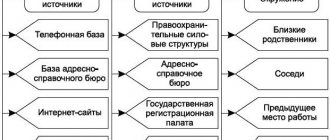The recipient of alimony has the legal right to put the defaulter on the executive wanted list. To do this, he needs to interact with bailiffs, since it is their responsibility to collect alimony debts.
In the article you can find the following information about the process of putting a child support defaulter on the wanted list:
- When can you file a search for a debtor?
- How to write an application (sample)
- How does a bailiff conduct a search?
- How long can search activities last?
- What liability does the defaulter face if he is found?
We also tell you how you can influence the bailiff if he refuses to look for the alimony debtor.
In what case is the search for the debtor parent carried out?
As part of the initiated enforcement proceedings, the bailiff is given the legal ability to carry out a number of actions aimed at the full and comprehensive repayment of alimony debt.
The search can be initiated both on the personal initiative of the bailiff, and on the basis of an application from the alimony claimant, if the following conditions are met:
- Evasion of the payer from fulfilling the obligation to transfer alimony
- The amount of alimony debt exceeds 10,000 rubles.
- The bailiff and the collector cannot establish contact with the debtor.
- Absence of alimony payer at the place of registration or residence.
- Dismissal of the debtor from a previously known place of work without notification of a new place of employment.
If the husband (the child’s father) does not pay alimony, most often the child’s mother insists on carrying out investigative measures.
Purposes of investigative activities:
- establish the actual location of the alimony debtor;
- determine the location of his property, which can be seized in order to fulfill the requirements of the writ of execution;
- to implement the duty of the bailiff to personally notify the defaulter that he will be held accountable for non-payment of alimony - until the debtor is notified of extreme measures of liability against signature, the bailiff has no right to apply them.
Establishing information about the alimony payer
The bailiff service, as well as police officers within the framework of the criminal investigation, are authorized to send official requests to public and private institutions if this allows them to find the debtor. In particular, cooperation has been established with the following organizations:
- The Russian real estate register, which contains information about all real estate objects and transactions carried out with them (allows you to track large purchases of the debtor using personal funds, as well as the alienation of objects for profit);
- Traffic police (provides information on prosecution for violation of traffic rules, which makes it possible to establish the last location of the person);
- Credit history bureau containing information about all loans taken and repaid by the alimony provider, as well as current delays in payments;
- Pension Fund (has information regarding the official employment of a citizen and the amount of income received);
- Federal Tax Service (will allow you to find out about the registration of a parent as an individual entrepreneur with subsequent receipt of profit);
- FSS (contains data on social benefits that can be used for debt collection).
How to make an application to search for alimony debtor
As a rule, bailiffs simultaneously conduct a large number of enforcement proceedings, so they do not always have time to independently initiate searches for defaulters. To speed up the process, the recipient of alimony can “remind” the bailiff of himself and contact him with an application to search for the parent who has stopped making payments.
The application is sent to the branch of the Federal Bailiff Service (FSSP) in which the proceedings under the writ of execution were previously initiated. It can be sent by registered mail with notification, but it is better to personally visit the FSSP on the reception day and submit the application to the official.
The document must contain:
- full name of the FSSP body in which the proceedings were initiated;
- FULL NAME. bailiff conducting the proceedings;
- information about the recipient of alimony, including information about place of residence and methods of communication, as well as place of work and additional contacts;
- name of the document “Statement to search for the debtor”;
- a descriptive part that reveals the essence of the existing problem;
- an indication of the need to search for the debtor;
- a description of additional information that allows you to establish the location of the debtor, the amount of property owned by him and his available income - if possible.
Search for the debtor's property abroad
The Russian legal framework does not yet provide for procedures for searching for property and foreclosure within the framework of enforcement proceedings initiated in the Russian Federation outside our country. To confirm information about the presence of property abroad, bailiffs can submit a request for legal assistance to a foreign authorized body. This document is submitted through the Central Office of the Ministry of Justice if there are facts that make it highly probable that the debtor has bank accounts, real estate and vehicles abroad.
Application processing time
The legislation defines a three-day period that is given to the bailiff for the purpose of considering the application received from the child’s parent. Having studied the circumstances set out in the application, the official makes a decision on the possibility of a search or the absence of grounds for conducting it.
The search for an alimony debtor is carried out only after the bailiff has issued a Resolution, which contains a decision to put the obligated person on the wanted list. As a general rule, like any other document of enforcement proceedings, copies of the resolution must be sent to the recipient of payments and the payer. The parties to enforcement proceedings have the right to appeal this decision.
Who can search for the debtor's property
The question of who can launch a search worries all debtors of loans, taxes, alimony and other obligatory payments. It is important for such citizens to distinguish legal requirements from the “tricks” of creditors and debt collectors.
There is no law prohibiting a third party from searching, collecting and analyzing information about the debtor's property. This is exactly the kind of search that debt collectors, “debt collection services” and private detective agencies do. But only the FSSP is authorized to carry out search activities, involving, if necessary, employees of the Ministry of Internal Affairs.
How is the FSSP search carried out?
Bailiffs use various working methods and sources of information to search for debtors, namely:
- They make requests about the debtor to various databases of reference and search information.
- They process various personal data, including information about the defaulter himself and his property.
- Conduct identity checks of citizens.
- They inspect residential and non-residential premises, as well as vehicles of wanted persons.
- They study various documentation that belongs to the debtor.
- They disseminate information about the debtor and information that he is wanted using the media, including via the Internet.
- Send requests to authorities that cooperate with the FSSP:
- Pension Fund;
- banks and other credit organizations;
- internal affairs bodies: Ministry of Internal Affairs, State Traffic Safety Inspectorate;
- bodies that register property rights, including real estate;
- tax authorities;
- customs and so on.
All these actions are aimed at determining the location of the defaulter, as well as his property, which can be seized.
Time limit for searching for alimony debtor
Often, search activities do not bring results for years. In this case, the recipient of alimony suffers - the child for whom the funds should have been paid.
To protect the interests of alimony recipients, in March 2021, Law No. 48-FZ was adopted, thanks to which, after 1 (one) year of unsuccessful search for the alimony debtor, the claimant has the right to apply to the court with a claim to recognize the debtor as missing.
The unknown absence of the debtor gives the alimony collector the right to receive a survivor's pension for the child. Even if the defaulter is found later, the claimant will not have to . The alimony provider will be required to pay the debt to the state, as well as transfer funds to the child until he comes of age.
Submission order
Searching for a debtor in the vast Russian expanses is a complex undertaking. Cases are often closed due to the impossibility of collection. Therefore, it is better to first try to find the defaulter yourself. Then the application is supported by the results of the activities of the detective agency, if the applicant applied there, or by data obtained by the media.
The game of catch-up will be played not only on the territory of the Russian Federation, but also in other states, if such a possibility is provided for by an international treaty.
A debt amount exceeding 10 thousand rubles will prevent the debtor from leaving the Russian Federation if the bailiff files a lawsuit in court to introduce this restriction.
Bringing the debtor to justice
Criminal or administrative liability may be one of the coercive measures imposed on defaulters by FSSP officials. These types of liability may apply even in cases where alimony is paid in part by the debtor, which is the reason for the debt.
Administrative penalties, including fines of various levels, deprivation or restriction of certain types of rights, may be applied to those debtors who intentionally interfere with the proper work of bailiffs. Such actions can be expressed in the provision of false information about earnings, property, or place of employment.
Criminal liability is a more severe punishment and can be imposed only on those persons who especially maliciously fail to fulfill their obligations to pay alimony. As a rule, such persons deliberately hide their income, the name of their employer, and the volume and location of their property.
Bailiffs are empowered to involve debtors in administrative penalties. Criminal penalties can only be established by a court decision and be expressed in forced labor, arrest, and the determination of prison terms.
Criminal liability for persistent defaulters
A person who evades paying child support for two months commits an offense under Art. 5.35.1 Code of Administrative Offenses of the Russian Federation. The court can arrest him for 10-15 days, send him to community service for a period of up to 150 hours, or fine him 20,000 rubles. If the violation continues for another two months, it may be regarded as repeated. In this case, the debtor will have to answer under Art. 157 of the Criminal Code of the Russian Federation.
FSSP officers initiating criminal prosecution can cite the following arguments to justify the legality of using Article 157 of the Criminal Code of the Russian Federation:
- The debtor has intent to fail to comply with a court decision on alimony.
- Change of employer without warning to the claimant or bailiff.
- Concealment of real income.
- Lack of desire to find a job or register as unemployed.
- Lack of response to the bailiff’s demands for payment of alimony and his warnings about possible liability.
A court that finds a debtor guilty may imprison him for a year, arrest him for 3 months, or send him to correctional labor for 12 months.
What to do if the bailiff refuses to search for the debtor and his property
The FSSP is a government agency. Bailiffs do not have the right to refuse to accept an application to search for a debtor. After the claimant’s application has been considered, the bailiff either begins search activities or explains his refusal in writing.
The recipient has the legal opportunity to appeal decisions containing a refusal to search, which is expressed in the form of an appeal to higher officials or bodies of the FSSP, the prosecutor or the court. The complaint submitted must contain information about the date of filing the initial search application, the range of actions of the bailiff, and the norms of the violated legislation.
How are search activities terminated?
To suspend or terminate the search for the defaulter, it is necessary to issue an appropriate resolution approved by the senior bailiff. The results of the event must be reflected in a special certificate.
The grounds for stopping the search are:
- determining the location of the debtor or his property;
- expiration of the deadlines specified in the resolution;
- completion of enforcement proceedings;
- obstruction of the search for the defaulter by the creditor.
The search operation is carried out within two months, but if necessary, this period is extended for an additional 60 days. For this purpose, an appropriate resolution must be passed.
Who is wanted?
The bailiff conducting enforcement proceedings has the right to announce a search. He can independently initiate the search procedure in certain cases established by law:
- the case concerns arrears of obligatory budget payments in the amount of at least 10 thousand rubles;
- proceedings were initiated in connection with the collection of alimony or compensation for damage caused.
In other cases, when it comes to property debts, in order to announce search activities, the bailiff requires a written statement from the claimant.
Execution of actions upon detection of a debtor
If during the investigative actions it is established where the obligated person lives or works, and the location of his assets and accounts is revealed, the proceedings will resume according to the general rules of Law No. 229-FZ. To do this, the bailiff must cancel the search warrant, after which standard enforcement measures will be applied:
- documents can be sent to the place of work for retention;
- bank accounts and cards may be seized;
- movable and immovable property is subject to arrest and sale for settlement with the claimant;
- may introduce restrictions on traveling abroad and deprivation of the right to drive transport.
If the fact of intentional obstruction of enforcement proceedings, malicious evasion of alimony payments, untimely notification of a change of residence or work is confirmed, an administrative or criminal case may be initiated. If the debtor subsequently disappears from the FSSP specialists again, the search may be announced again.







